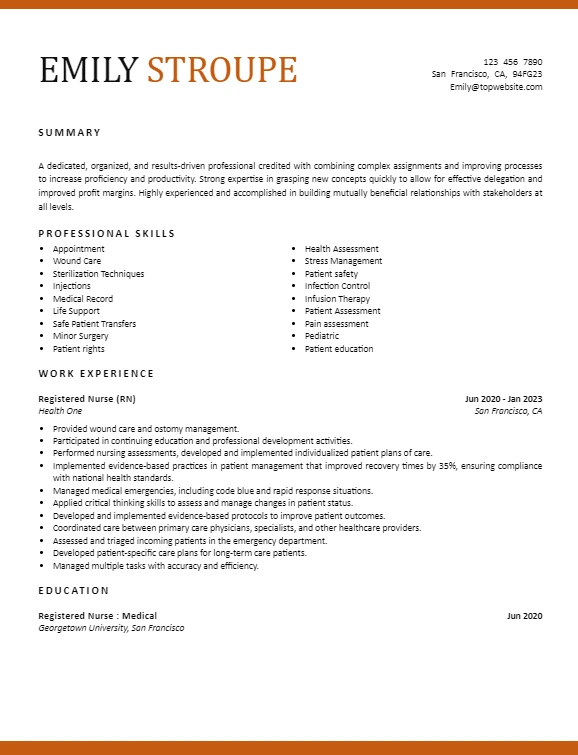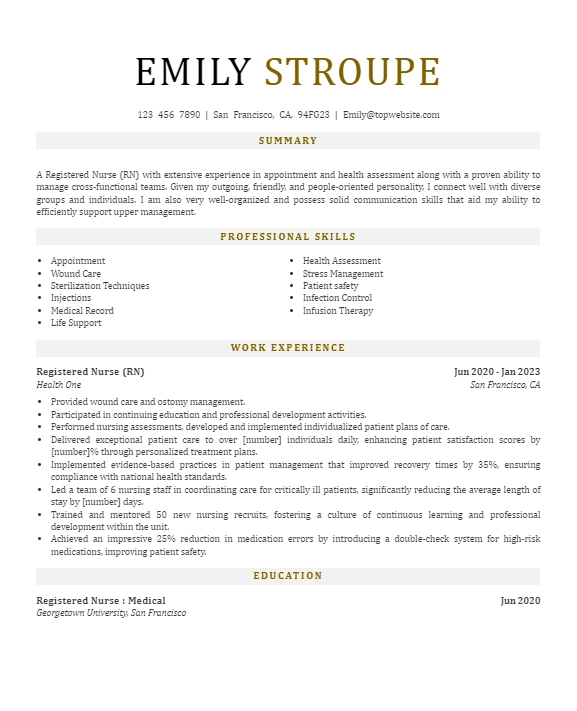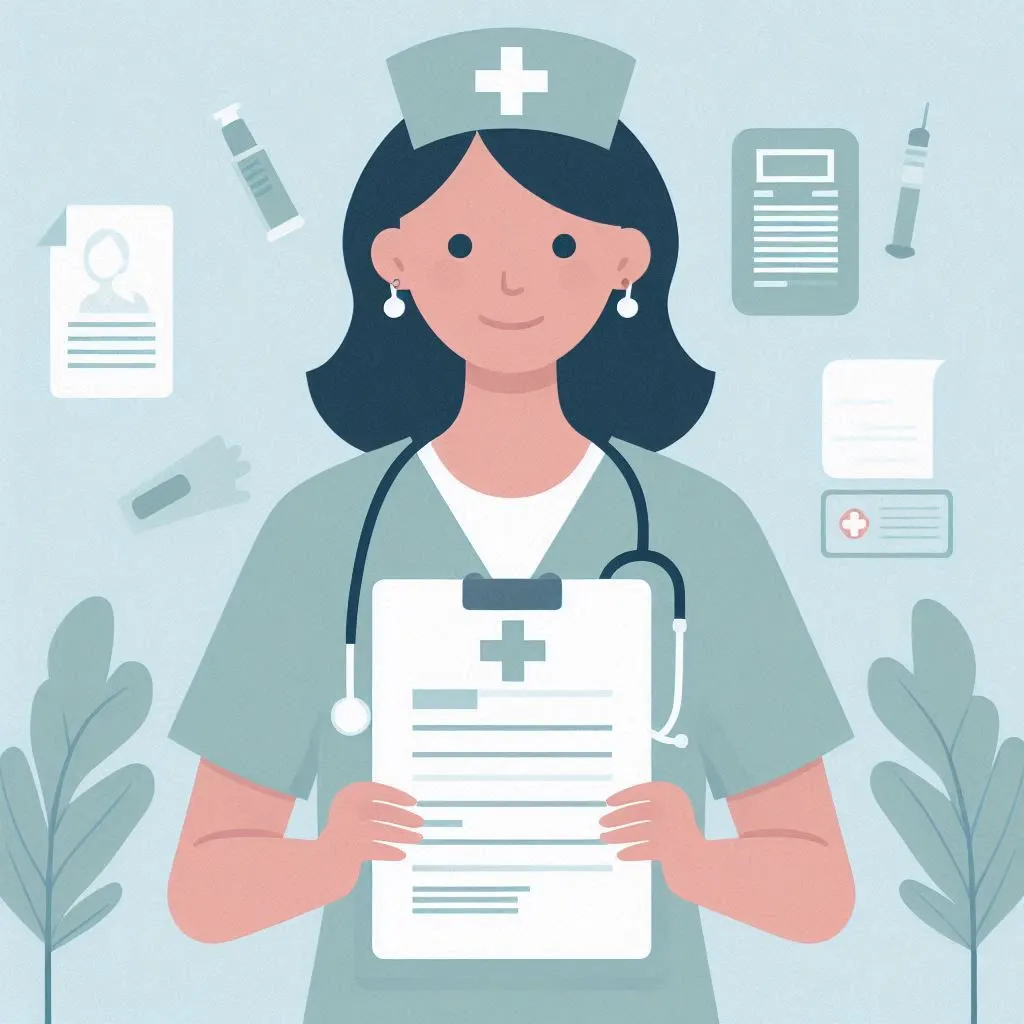Registered nurses are in more demand than ever. According to the World Health Organization.), there are around 29 million nurses throughout the world, and there is an estimated shortage of 4.5 million nurses. This global nursing shortage is expected to increase to 4.5 million nurses by 2030.
This article serves as a comprehensive nursing resume guide, offering tips, nursing resume templates, and examples to help you create an effective resume.
In the United States, the Health Resources and Services Administration issued a 2022 National Sample Survey revealing that America has an estimated 4.3 million actively licensed registered nurses, 3.5 million of whom are gainfully employed full-time. Unfortunately, there are only an average of 9 nurses for every 1,000 people in the United States. That is not enough to cover the nursing demands in the healthcare industry.
The good news is that registered nurses will have no trouble finding openings for RN job positions in hospitals, urgent care facilities, private care practices, travel nursing care, home healthcare, and all clinical settings. The bad news is that there is growing competition for nursing positions because medical facilities are outsourcing to other countries to find qualified registered nurses to fill their vacation positions.
If you want to beat out the competition and land your dream job as a registered nurse, you need to write a powerful registered nurse resume that will stand out the most to your potential employers. Strategies for crafting the best nursing resumes can help you pass applicant tracking systems and stand out in a competitive job market. The skills for registered nurse resume writing include communication, critical thinking, and writing in a clear, concise, and descriptive manner.
Using nursing resume templates can make it easier to create an effective, ATS-friendly resume that meets industry standards. Many employers prefer well-organized and straightforward resume templates to keep the focus on qualifications rather than distractions from graphics or colors.
Introduction to Nursing Resumes
A well-crafted nursing resume is the cornerstone of a successful job search in the healthcare industry. As the first impression you make on potential employers, your nursing resume must clearly showcase your clinical skills, relevant experience, and educational background. In today’s competitive job market, hiring managers often rely on applicant tracking software (ATS) to filter through hundreds of nursing resumes, making it essential to optimize your resume with the right keywords and structure.
A strong nursing resume not only highlights your hands-on clinical skills but also demonstrates your ability to adapt to diverse patient populations and work effectively within interdisciplinary healthcare teams. Key elements of an effective nursing resume include a compelling professional summary, a detailed work history, a list of nursing skills, and up-to-date certifications. To stand out, tailor your resume to each job search, ensuring it aligns with the specific requirements of the position and passes through ATS filters. By focusing on clarity, relevance, and impact, you can create a nursing resume that captures the attention of hiring managers and opens doors to new career opportunities.
The Top 8 Steps to Writing an Effective Registered Nurse Resume
Recruiters and hiring managers receive hundreds of resumes each day from licensed registered nurses seeking active part-time and full-time employment. When they see your resume for the first time, it should give them a positive first impression of your skills, experience, education, and abilities as a qualified registered nurse. Hiring managers spend less than ten seconds reading resumes during initial evaluations, so it is crucial to make your resume concise and impactful.
Nursing professionals can use these steps to tailor their resumes for ATS scans and hiring managers by focusing on proper formatting, relevant keywords, and logical organization. Following these steps will help your nursing resume beat the ATS and reach hiring managers.
Below are eight critical steps to help you begin writing your registered nurse resume.
1) Gather all Your Nursing Documentation and Information
Before you even begin writing your resume, you need to gather all relevant documentation and information related to your nursing background. Having this information in front of you will ensure you don’t leave out any vital information as you write your resume.
Here are some examples of the documents you should gather:
- RN License showing the license number
- College or university diplomas for nursing
- College or university transcripts
- Specialization certificates or certifications in the nursing field
- Reference letters
- Records of your nursing education, including details of clinical rotations completed during your studies
These documents can help you retrieve important details about your professional or educational background that you can include in your resume. Be sure to include information about your clinical rotations as part of your nursing education background.
2) Add Contact Information
Now, you can begin writing your registered nurse resume. The first section at the very top of the resume should include your name and contact information, such as the following: Providing contact information at the top of the resume is essential, including a professional email address and a phone number.
Emily Rodriguez, RN, BSN
Chicago, IL | (555) 772-9982 | emily.rodriguez@email.com | LinkedIn: linkedin.com/in/emilyrodriguez
Don’t forget to include “RN” or “Registered Nurse” somewhere after or around your name to display your professional designation as a registered nurse.
3) Write Your Mission Statement or Career Objective
The next section of your resume is the mission statement or objective, also known as the nursing resume objective. The nursing resume objective is a statement focused on your career aspirations and goals in the nursing field, whereas a resume summary highlights your skills, experience, and achievements to showcase your immediate value.
The stated objective doesn’t need to be more than one or two sentences long, but it should summarize your professional background and what you can contribute to the job if you get hired.
Try to include the following in one or two sentences:
- Skills
- Experience
- Career goals
- The value you can give to your employer
Please don’t overlook writing your registered nurse resume objective. Some employers won’t even bother reading the other details of your resume if there is not a quality-written objective at the top.
4) Highlight Your Educational Background
A Bachelor of Science in Nursing is the minimum educational requirement for most registered nursing positions, especially those in the United States. There are four-year degree equivalents in other countries that you need to earn if you plan to work outside of the United States.
Your four-year nursing degree must come from an accredited university or college. If you have a registered nursing license, then chances are that your state or local government has already verified the accreditation and legitimacy of your nursing degree.
Your registered nurse resume must show all relevant details related to your accredited four-year nursing degree. Demonstrating your educational career progression, such as moving from an associate’s degree to a bachelor’s degree, can further strengthen your resume by highlighting your commitment to professional development. Here is an example of what you could list in the educational background section of your resume:
Bachelor of Science in Nursing, University of Central Florida, Daytona Beach, FL
- Graduated Magna Cum Laude – August 2018
- GPA 4.0
You can also include relevant experiences, such as research projects, clinical placements, or leadership roles, that demonstrate your suitability for the nursing role.
You don’t necessarily need to include any lesser educational achievements, such as your high-school diploma or associate’s degree, because the four-year degree is all that matters. Employers will already assume you earned a high school diploma and a two-year degree if you have a four-year degree.
5) List Your Active Licenses and Certifications
Licenses and certifications are different from your educational background because, unlike your college degree, your licenses and certifications can expire. That is why your registered nurse resume should only list your “active” nursing licenses and any specializations or certifications associated with the profession. If you are a licensed practical nurse, be sure to include your LPN license and tailor your LPN resume to highlight your practical experience and relevant skills. For those with advanced practice credentials, such as a nurse practitioner, include your nurse practitioner certification and ensure your nurse practitioner resume emphasizes your advanced diagnostic and treatment capabilities, as well as specialized skills.
Here are some examples of registered nursing licenses and certifications:
- RN – Registered Nurse in the State of Wisconsin (License #12345)
- ACRN – HIV/AIDS Certified Registered Nurse
- CARN – Certified Addictions Registered Nurse
- CBRN – Certified Burn Registered Nurse
- CFRN – Certified Flight Registered Nurse
- CGRN – Certified Gastroenterology Registered Nurse
- CURN – Certified Urologic Registered Nurse
- SCRN – Stroke Certified Registered Nurse
- TCRN – Trauma Certified Registered Nurse
Your RN license information should be at the top of the list. Any additional certifications that you have can open up more job opportunities for you in the nursing field if you prefer to nurse in a particular area of healthcare.
6) Briefly Describe Your Previous Work Experience
The work experience section is usually the biggest section of a registered nurse resume unless you are new to the profession. Even then, list any previous internships or healthcare-related jobs you might have done in the past, such as being a home healthcare aide or certified nursing assistant (CNA), to demonstrate valuable clinical exposure. For new nursing graduates, highlighting clinical rotation skills can enhance job application efficacy. Every little bit of experience helps.
Many people use bullet point lists to highlight the responsibilities and requirements of each job that they worked in the past. When creating these lists, tailor your job descriptions to emphasize direct patient care, patient assessments, and relevant nursing specialties such as emergency room nurse, ICU nurse, telemetry nurse, and school nurse roles. Including these details helps showcase your hands-on clinical experience and aligns your resume with specific nursing positions. Hiring managers don’t have time to read through lengthy paragraphs describing your work history. They would much rather scan through the bullet point lists to quickly understand the work responsibilities that you had previously.
Be sure to include achievements such as improving patient outcomes, managing post surgical care, implementing pain management protocols, and contributing to chronic disease management. Providing specific examples of specialized experience, such as post surgical care, pain management, and chronic disease management, demonstrates your expertise and impact in these areas. Recruiters prefer measurable results in resumes to assess the effectiveness of nursing candidates.
Here is what that might look like:
RN in Emergency Trauma Unit – Rosemary Hospital, Detroit, Michigan
(November 2015 – December 2021)
- Supervise nurses to ensure they are delivering the best patient care possible in a fast-paced environment
- Operating medical diagnostic equipment to quickly diagnose patients suffering severe injuries
- Deliver oral and IV medications and monitor patient responses
- Coordinate evaluations and treatments with other doctors and nurses
- Treat up to 25 patients per day
Of course, the details of your work history may look vastly different than this. But the list is just meant to be an example of how you list specific information about your previous job responsibilities and requirements in a given workday.
7) List Your Key Skills
Many people forget to include a list of their key skills for registered nurse resumes. It is important to include a list of your skills because hiring managers want to know what skills you can bring to the job. Your skills are not always clear when they read through your educational background and work experience because so many other applicants have similar education and work experience.
When creating your resume, be sure to list both hard skills and soft skills. Hard skills are measurable, job-specific technical abilities such as proficiency with medical technology or electronic health records, while soft skills include communication, empathy, and teamwork. Balancing hard and soft skills in your key skills section creates a well-rounded profile that appeals to employers.
Here is an example of a basic key skills section on a registered nurse resume:
Key Skills
- Trauma and wound care
- Medication administration (IV, Oral)
- Diagnosing and assessing patients
- Managing nursing teams
- Educating patients
- Researching electronic medical records
- Proficiency with electronic health records (EHR)
- Operation of medical technology and equipment
- Time management in fast-paced care environments
- Strong communication and leadership
Soft Skills Highlight: Excellent communication, empathy, adaptability, and teamwork are essential soft skills for nurses, supporting patient-centered care and effective collaboration.
You don’t have to write a long list of skills because it would end up flowing off your resume page. It is best to highlight your most essential skills that can help you perform well at the job you are applying for.
8) Other Sections You May Want to Include
If you were only to list the sections mentioned above on your resume, then it would be effective enough to get called in for an interview. However, if you have any additional information you would like to share about yourself, you can create smaller optional sections to highlight that information briefly. Candidates are encouraged to highlight leadership capabilities, such as coordinating patient activities to boost morale and collaboration with nonprofits for hospital improvements.
Here are what some of those optional sections might be:
- Awards & Honors
- Foreign Language (e.g., Spanish, Mandarin Chinese, French)
- Peace Corps / Volunteer Work
- Patient Advocacy (e.g., experience advocating for patients in specialized units or patient-centered care organizations)
- Advanced Practice Nurses (for those with advanced credentials, certifications, or leadership roles, consider including a section detailing your scope of practice and advanced education)
Not all hiring managers will care about these things, but some of them might. It never hurts to try if you have these achievements in your background.
Also Read :- Flight Travel Nurse Resume
Final Tips
The rule of thumb is to keep your registered nurse resume on one page only. Remember that hiring managers don’t have the time to read through multiple pages of a resume because they are considering several different potential job candidates. For candidates with less than ten years of experience, a one-page resume is ideal, while those with more extensive backgrounds may require a two-page resume. So, the clearer and more concise you can make your resume, the better chance you will have of getting a callback from the hiring manager.
You might not currently possess the skills for registered nurse resume writing, but you will develop those skills as you continuously practice writing your resume. Just use the registered nurse resume examples below as a guide to writing your resume. Reviewing nursing resume examples can help you understand effective formatting and content strategies that make your application stand out.
Read More :- Skills For Nurse Resume
Registered Nurse Resume Examples
Do you want to look at some registered nurse resume examples to get some additional perspective on what a high-quality resume looks like? These examples are particularly useful for the experienced nurse aiming to highlight their nursing expertise, as they demonstrate how to effectively showcase clinical skills and specialized knowledge. Below are two examples that showcase the most important elements that should be included in a registered nurse resume:
Resume Example #1

Ready to Land Your Next Job?
Don’t let your resume get lost in the stack. Build a professional, ATS-friendly resume that highlights your leadership, achievements, and industry expertise.
Registered Nurse Resume Text Example 1 :-
Emily Rodriguez, RN, BSN
Chicago, IL | (555) 772-9982 | emily.rodriguez@email.com | LinkedIn: linkedin.com/in/emilyrodriguez
Professional Summary
Compassionate Registered Nurse with 5+ years of experience delivering patient-centered care in hospital settings. Skilled in administering medications, coordinating treatment plans, and collaborating with interdisciplinary teams. Known for strong clinical judgment, effective communication, and dedication to improving patient outcomes in fast-paced environments.
Core Skills
- Patient Assessment & Monitoring
- Medication Administration & IV Therapy
- Care Planning & Coordination
- Electronic Health Records (Epic, Cerner)
- Patient & Family Education
- Infection Control & Safety Protocols
- Multidisciplinary Team Collaboration
- Emergency Response & Critical Thinking
Professional Experience
Registered Nurse – Medical-Surgical Unit
Chicago General Hospital, Chicago, IL
August 2019 – Present
- Provide care for 20+ patients per shift, including medication administration, wound care, and vital sign monitoring.
- Developed individualized care plans, resulting in improved patient satisfaction scores by 15%.
- Collaborated with physicians, PTs, and dietitians to coordinate holistic treatment.
- Precepted 3 new nurses, mentoring them on clinical and hospital protocols.
Registered Nurse – Telemetry Unit
St. Mary’s Medical Center, Chicago, IL
June 2017 – July 2019
- Monitored patients with cardiac conditions using telemetry systems.
- Responded to emergency codes and assisted in stabilizing patients.
- Provided patient and family education on post-discharge care.
Education
Bachelor of Science in Nursing (BSN)
University of Illinois at Chicago — Chicago, IL
Graduated: 2017
Certifications
- Registered Nurse (RN), Illinois Board of Nursing
- Basic Life Support (BLS) Certified
- Advanced Cardiovascular Life Support (ACLS)
Additional Activities
- Volunteer Nurse, Community Free Clinic.
- Member, American Nurses Association (ANA).
Resume Example #2 –

Registered Nurse Resume Text Example 2:-
Emily Rodriguez, RN, BSN
Chicago, IL | (555) 772-9982 | emily.rodriguez@email.com | LinkedIn: linkedin.com/in/emilyrodriguez
Professional Summary
Compassionate Registered Nurse with 5+ years of experience delivering patient-centered care in hospital settings. Skilled in administering medications, coordinating treatment plans, and collaborating with interdisciplinary teams. Known for strong clinical judgment, effective communication, and dedication to improving patient outcomes in fast-paced environments.
Core Skills
- Patient Assessment & Monitoring
- Medication Administration & IV Therapy
- Care Planning & Coordination
- Electronic Health Records (Epic, Cerner)
- Patient & Family Education
- Infection Control & Safety Protocols
- Multidisciplinary Team Collaboration
- Emergency Response & Critical Thinking
Professional Experience
Registered Nurse – Medical-Surgical Unit
Chicago General Hospital, Chicago, IL
August 2019 – Present
- Provide care for 20+ patients per shift, including medication administration, wound care, and vital sign monitoring.
- Developed individualized care plans, resulting in improved patient satisfaction scores by 15%.
- Collaborated with physicians, PTs, and dietitians to coordinate holistic treatment.
- Precepted 3 new nurses, mentoring them on clinical and hospital protocols.
Registered Nurse – Telemetry Unit
St. Mary’s Medical Center, Chicago, IL
June 2017 – July 2019
- Monitored patients with cardiac conditions using telemetry systems.
- Responded to emergency codes and assisted in stabilizing patients.
- Provided patient and family education on post-discharge care.
Education
Bachelor of Science in Nursing (BSN)
University of Illinois at Chicago — Chicago, IL
Graduated: 2017
Certifications
- Registered Nurse (RN), Illinois Board of Nursing
- Basic Life Support (BLS) Certified
- Advanced Cardiovascular Life Support (ACLS)
Additional Activities
- Volunteer Nurse, Community Free Clinic.
- Member, American Nurses Association (ANA).
Job Search and Application Tips
When applying for nursing positions, it’s crucial to tailor your nursing resume to each job description. Carefully review the job description and incorporate relevant keywords and nursing skills that match the employer’s requirements. This not only helps your resume pass through applicant tracking software but also shows hiring managers that you are a strong fit for the nursing position.
Be sure to include a professional summary that aligns with the job description, and highlight your most relevant nursing skills and work experience. Consider organizing your resume so that your most impressive achievements and specialized skills are easy to find. Additionally, take advantage of career coaching services or online resources to refine your resume and cover letter and prepare for interviews. By customizing your application materials and focusing on the qualifications that matter most to each employer, you can increase your chances of landing interviews and securing your ideal nursing position.
Nursing Career Development
Nursing career development is an ongoing journey that requires continuous learning and skill enhancement. As you advance in your nursing career, it’s important to regularly update your nursing resume to reflect new nursing skills, certifications, and experiences. Highlighting specialized nursing skills—such as critical care, palliative care, or advanced cardiac life support (ACLS)—demonstrates your commitment to providing high quality patient care and improving patient outcomes.
Pursuing additional certifications, such as those offered by the American Nurses Credentialing Center, can set you apart from other candidates and open doors to advanced practice nursing roles. Engaging in continuing education, attending industry conferences, and participating in professional organizations are excellent ways to stay current with the latest healthcare advancements and best practices. By investing in your professional growth and keeping your nursing resume up to date, you not only enhance your own career prospects but also contribute to improved patient outcomes and the overall advancement of the healthcare industry.
CONCLUSION
In conclusion, the growing demand for registered nurses, both globally and in the United States, offers significant job opportunities in various healthcare settings. However, the competition for these roles is intensifying, making it essential for aspiring nurses to create standout resumes. A combination or hybrid resume format is effective for experienced nurses with varied specialties, balancing skills focus with work history. By following the steps outlined in this guide—gathering your nursing documentation, crafting a clear objective, showcasing your education, certifications, and experience, and highlighting your skills—you can build a strong resume that captures the attention of potential employers and increases your chances of landing your dream job.
Additional Information
- Cover Letter templates
- Resume skills
- Resume summary
- Suggestions for further reading and exploration of related topics in resume building.








